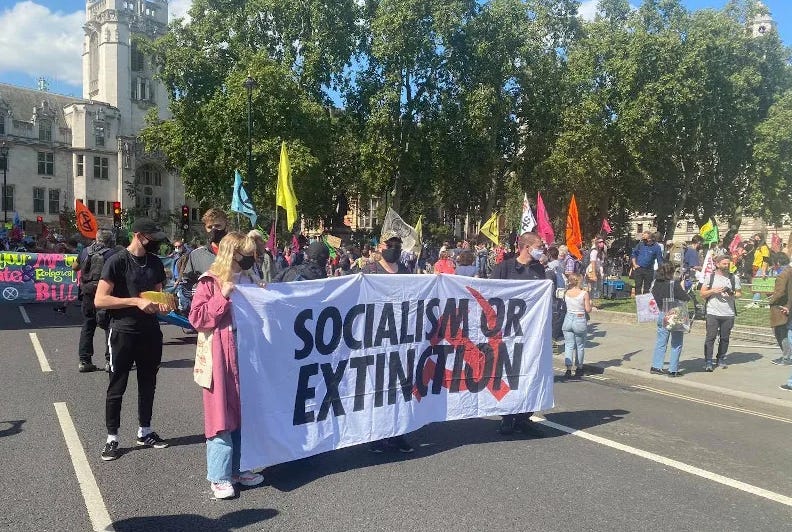Nuremberg trials for net zero
A trial about responsibility
“We must learn to live together as brothers or perish together as fools.”
—Martin Luther King Jr. 1
Following World War II, the global community united in a remarkable display of moral resolve. The Nuremberg Trials held perpetrators of crimes against humanity accountable. Today, in an entirely different but no less consequential domain, one might ask: Should there be Nuremberg-like trials for environmentalists? Should they, too, be held responsible for the harm they caused?
It is difficult to quantify the misery caused by environmentalists. Allow me to try.
First, roughly 50-100 million people died from the ban of DDT in 1972. Environmentalists, including the newly formed U.S. Environmental Protection Agency (EPA), initiated the ban in response to the 1962 book Silent Spring, where Rachel Carson thought DDT was harmful to robins. The ban was from 1972 to 2006 despite Swiss chemist Müller receiving a Nobel prize for highlighting its benefits and the number of lives it saved during WWII. See The history of climatism, Part 5.
“Those who promoted the banning of DDT and other pesticides, in order to eliminate the dangers created by residues, seldom take responsibility for the resurgence of malaria that followed.”
—Thomas Sowell (b. 1930), American economist2
Second, the use of fossil fuels costs around 7-10 million lives per year, not because of CO2, but because of all the other stuff. Environmentalists have been fighting the next best alternative to fossil energy, nuclear energy, for more than 50 years. Another charge against environmentalism is its persistent opposition to cheap, reliable energy — the very foundation of modern civilization. Fossil fuels lifted billions out of poverty. Yet environmentalist dogma treats oil, gas, and coal as irredeemable evils while promoting wind and solar — technologies that remain expensive, intermittent, infrastructure-heavy, and comically inefficient, especially for nations just beginning to industrialize.
Third, (watermelon green) environmentalists have been fighting capitalism for a long while, arguably longer than when socialists had to find a new way of indoctrinating the young, ignorant and naive after the Berlin Wall fell in 1989. Fighting capitalism means fighting the only thing that has ever worked to reduce poverty. The key aspect is that capitalism reduces the cost of capital, and the fight against capitalism doesn’t. I cannot quantify the death toll in this case. But here’s a “factoid” for the human cost: Mao's Great Leap Forward, which was as moral-highground-ish then as net zero is today, took around 30-50 million lives and reduced life expectancy from around 50 years to the low 30s.
“In the event that I am reincarnated, I would like to return as a deadly virus, to contribute something to solving overpopulation.”
—Prince Philip (1921-2021), Duke of Edinburgh3
Fourth, environmentalists have been fighting all four agriculture revolutions, especially the third one, for a long while. The quote above captures their “spirit”. Paul Ehrlich, author of The Population Bomb and a hero to environmentalists, has been at odds with Norman Borlaug, the central figure of the Third Agriculture Revolution and a hero to your author, for decades. Norman Borlaug reduced the cost of energy, which is anathema to environmentalists, as it is this reduction in the cost of energy, food in this case, that allows humans to flourish and multiply. Environmentalist groups vilified him for promoting “industrial” agriculture, chemical fertilizers, and genetically modified crops — the very innovations that feed the world. In some cases, these groups actively campaigned to block the implementation of such technologies in Africa and elsewhere. Greenpeace has fought Golden Rice and even mobilised senior Swiss ladies for their cause. Norman Borlaug is credited with saving the lives of one billion people. The (radical) environmentalists wouldn’t have minded if he hadn’t. Again, the number of deaths caused by environmentalists is challenging to quantify. A comparison to Lysenkoism might help. The aversion to the agricultural revolutions and modern agriculture by environmentalists today somewhat resembles Lysenkoism, a political campaign led by the Soviet biologist Trofim Lysenko against genetics and science-based agriculture in the mid-20th century. The estimated death toll from the government-sponsored policies, Lysenkoism, is around 10 million people.
“I am an environmentalist and founder member of the Greens but I bow my head in shame at the thought that our original good intentions should have been so misunderstood and misapplied.
We never intended a fundamentalist Green movement that rejected all energy sources other than renewable, nor did we expect the Greens to cast aside our priceless ecological heritage because of their failure to understand that the needs of the Earth are not separable from human needs.
We need take care that the spinning windmills do not become like the statues on Easter Island, monuments of a failed civilisation.”
—James Lovelock (1919-2022), British independent scientist, and futurist4
It is one thing to make errors in judgment. It is another to double down on them, generation after generation, in defiance of evidence, outcomes, and human needs. And it is still another thing — and this is where the analogy to Nuremberg becomes sharpest — to impose policies with foreseeable, large-scale human costs while claiming the mantle of moral superiority.
“One of the greatest mistakes is to judge policies and programs by their intentions rather than their results.”
—Milton Friedman (1912-2006), American economist5
In this light, a case could be made — if only as a thought experiment — for holding the architects of such suffering accountable. Not to punish good intentions but to highlight a grim reality: that when ideologies ignore human needs, they become dangerous. Where environmentalism resembles terrorism, some action has already been taken. Roger Hallam, for example, the co-founder of Extinction Rebellion, is safely behind bars until 2028, essentially for endangering/harming human beings way beyond just being a nuisance. Some Western countries have started to imprison environmentalist culprits of vegan parenting. That’s a good start. Enforcing a protein deficit in children who are still growing is an extraordinary form of cruelty.
“You can’t be a humanitarian and condemn the energy humanity needs.”
—Alex Epstein (b. 1980), American energy theorist and author6
The environmental movement is not monolithic, and not all of its actors deserve blame. Many have raised crucial awareness about pollution, conservation, and sustainability. But the radical strain — the one that sees humanity as a plague on the Earth, that places abstract ideals over real lives, that obstructs technological progress in favour of romantic fantasies — should be confronted.
This hypothetical trial, Nuremberg II, is not about vengeance. It’s about responsibility. Because the true crime is not in caring about nature. It’s in using that care as a shield for policies that leave the poor in the dark, the elderly in the cold in winter, the sick untreated, and the hungry unfed.
That, perhaps, is the real crime against humanity.
Trivia:
Speech in St. Louis on 22 March 1964.
Thomas Sowell, Is Reality Optional? And other Essays (Stanford: Hoover Institution Press, 1993), 3.
Prince Philip, when speaking to the German news agency Deutsche Press Agentur in 1988, quoted in Robert Mendick, “How Prince Philip used his wit and wisdom to charm – and outrage – the world,” The Telegraph, 11 April 2021. In a forward to Fleur Cowles, If I Were an Animal (New York: William Morrow, 1987) he wrote: “I just wonder what it would be like to be reincarnated in an animal whose species had been so reduced in numbers than it was in danger of extinction. What would be its feelings toward the human species whose population explosion had denied it somewhere to exist. I must confess that I am tempted to ask for reincarnation as a particularly deadly virus.”
James Lovelock, “I am James Lovelock,” stopthesethings.com, 31 January 2013.
Interview with Richard Heffner on The Open Mind, 7 December 1975.
Alex Epstein, The Moral Case for Fossil Fuels (New York: Penguin Group, 2014), 137.




Superb. The road to hell is also paved with aggressive virtue-signalling.
Tremendous article.